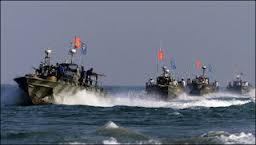An exercise of speculation:Vedanta,Adivasis, Mannar Basin and the Tamil genocide – Part 1
With the purchase of Cairn India, Mr Agarwal, boss of the mining powerhouse Vedanta resources, officially challenged the dominance of Reliance Industry, the Ambani’s giant in petrochemicals and refining[1][2]. Vedanta and Reliance were undisputed kings in their respective sectors: complementary and parallel. Both can count on mighty political clout and this feud showed their potential: in defence of Ambani’s Reliance went in Mr Sharma, chairman of the state-owned ONGC and Petroleum Secretary Mr Sundareshan. On the camp of Agarwal’s Vedanta, nobody less than UK’s Prime Minister David Cameron[3].
The bone of contention is simple: oil. In Sri Lanka[4]. Offshore of the Mannar Basin lie reserves up to a billion barrels. Reliance Industry was drilling on the Indian side of the Strait, but when the government of Sri Lanka offered the exploration rights in 2007, they Ambani’s group declined. Why?
Well there are always a lot of risks associated with oil extraction, first of all, there is no guarantee of discovery, second it could be not commercially viable to extract it.
But the Mannar Basin case was even riskier: it was the theatre of a civil war. The area was under the control of the LTTE, one the fiercest guerrilla army in the world. Surely if you buy, you want some guarantees that your will be able to access your property.
Now the company that was awarded the concession was Cairn, a small venture based in Edinburgh (with the bulk of their interests in India). What was the level of political leverage that Cairn could exercise to demand for assurance? Null. The management of Cairn, we are supposed to believe, bought the exploration rights with no further collateral for their purchase, no political promise that their property will be their hand soon.
But in 2011 Vedanta saved the “Scottish” company with their offer[5]. The operation was hardly contested by the Indian government; as we have seen, the move was an aggressive entrance in the landscape of Reliance and Ambani’s clan didn’t particularly welcome the new comer[6].
Agarwal acknowledged the leading role of Ambani: “They (Reliance) will continue to be the largest player. But, at the same time, there is enough water in the sea for other players to also do business.” [7]
If you are familiar with the Indian capitalism, you know very well that the big players are running monopolies supported by political protection. Competition is sacrilegious. So why Agarwal decided to challenge so directly Ambani?
Rumours go that he was concerned for his venture in Orissa[8]. Vedanta was involved in a billion mining project; they received of course all the authorization from the central government, but a small detail was blocking the operations: 80 million of Adivasis, the Indian Aborigines. The inconvenience was due to be quickly removed with mass evictions; this led the Adivasis to join the Maoist guerrilla, but Vedanta wasn’t worried: in fact the central government declared this insurgency (sometimes the Adivasis attacked with bows and arrows) as the nation’s main security threat: more than the archenemy, atomic-armed Pakistan. Operation Green Hunt was launched to eradicate the Maoist[9] and incidentally, any obstacle to Vedanta manoeuvres. Unfortunately for Vedanta, public and international outcry sprung in favour of Adivasis and suddenly the big deal, despite all the political support, was in peril[10]. The Orissa crisis urged Vedanta to look for alternative business[11]. Quickly.
[1] http://timesofindia.indiatimes.com/business/india-business/Anil-Agarwal-likely-to-pip-Mukesh-Ambani-as-richest-Indian/articleshow/6391168.cms
[2] http://articles.economictimes.indiatimes.com/2010-08-25/news/27601107_1_shale-gas-carrizo-pioneer-natural-resources
[3] http://www.telegraph.co.uk/finance/newsbysector/energy/8334832/David-Cameron-intervenes-for-Cairn-and-Vodafone-in-India.html
[5] http://articles.economictimes.indiatimes.com/2011-12-08/news/30490604_1_vedanta-cairn-deal-biggest-onshore-oilfield-biggest-m-a-deal
[7] http://articles.economictimes.indiatimes.com/2010-08-19/news/27627686_1_anil-agarwal-vedanta-resources-vedanta-sets
[8] http://www.livemint.com/Companies/bYw5ZVDdNEJy7PMIdWpj3I/Vedanta-says-considering-layoffs-at-Orissa-plant.html




Hey! I just would like to give a huge thumbs up
for the good info you might have here on this post.
I will likely be coming again to your weblog for more soon.